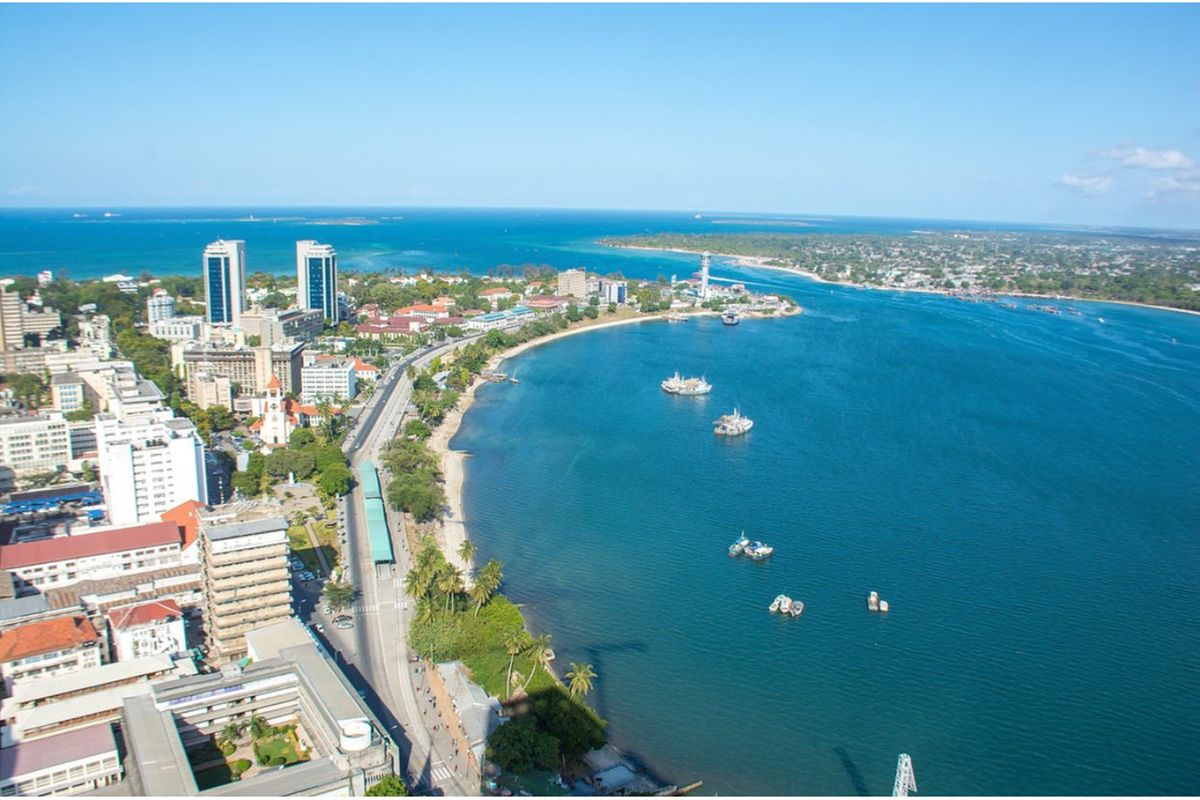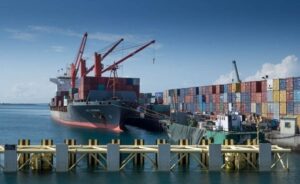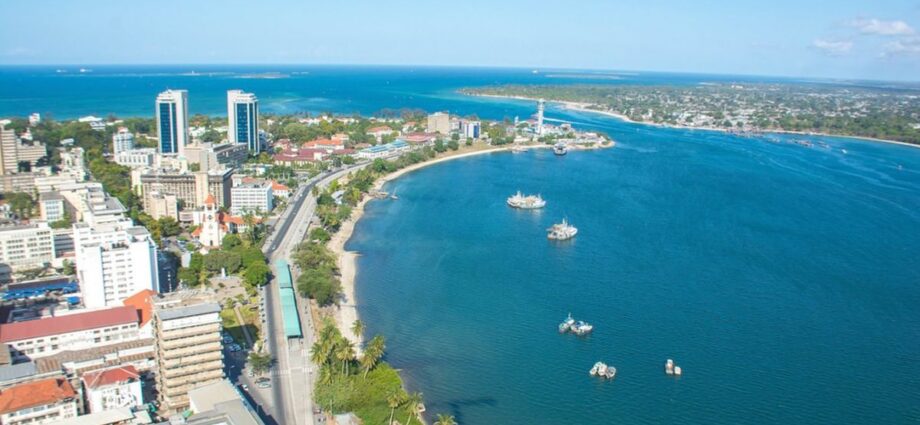
Tanzania:
Dar es Salaam’s epic coastline is the result of the battle that has been raging for millennia between the Indian Ocean and the East African continental drift. From Bagamoyo to Kimbiji, the city is dotted with stretches of pristine beaches that are ripe for exploration. Whether you are strolling along the silvery sands or diving into the crystal-clear waters, there is no shortage of breathtaking beauty to be found.
These beaches have seen it all, from the rise of Bagamoyo as a major trading post and the founding of Dar from the little fishing village of Mzizima by Sultan Majid in 1865 to the establishment of Dar as the capital of Germany’s East African operations in 1891. These silvery sands have witnessed the flow of gold, ivory, and slaves, and have been a hub of cultural exchange for centuries. Men and women from India, Persia, Arabia, Europe, and far inland all came and left their indelible marks.
I recently had the opportunity to visit Bagamoyo for a strategic planning retreat with a client. As is my habit when visiting new places, I took the opportunity to explore the area on foot. Walking along the beaches of Bagamoyo for a couple of kilometres was a truly enriching experience. The ocean’s beauty is undeniable; it has a way of being both therapeutic and awe-inspiring. Of course, my mind couldn’t help but wander to thoughts of tsunamis, a fear that has lingered with me since the devastating event in 2004. Thankfully, the evening was peaceful, and the beach was quiet.
The eerie quietness and emptiness of the beach were unsettling, though.
In Dar, the beaches appear to be equally ignored by residents too. Many seem to have completely forgotten that they live next to a rich coastline, a fact that is a massive selling point elsewhere. As a result, there is no beach life, and the ocean plays a limited role in shaping the character and culture of this city.
Now let us compare that with the beaches in Israel.
Years ago, I had similar beach walks along a 6-kilometre stretch connecting Tel Aviv and the ancient biblical town of Jaffa. Along this route, the beaches were lined with hotels and business blocks that now probably host hundreds of international firms. As the work hours were ending, throngs of people made their way to the beaches, transforming them into a bustling city party each night.
Dar lacks culture – all we have is the mind-numbing struggle for survival. But hey, at least we have enterprising firms like Samaki Samaki that try to fill the void with events that draw multitudes. The officials may not like the results, but if they don’t provide for legal and acceptable ways for people to unwind, they will turn to illegal and unacceptable alternatives.
It is nature’s way.
While strolling along the beach in Bagamoyo, I remembered a discussion I had with a businessman who had grand plans to transform Dar’s waterfront. He even submitted a proposal to the government outlining his vision.
The proposal, known as the Dar-Bagamoyo Waterfront Development Initiative, was developed by a businessman called Moto Mabanga with a team of local and international consultants in 2013. It proposed the creation of an economic corridor along the shoreline as a way to revitalise the city. The initiative was designed to be a collaboration between the public and private sectors. I was immediately impressed by the concept’s potential as I read the documents.
In the past, I have suggested numerous ways to rejuvenate Dar es Salaam, including transforming Kariakoo into a cultural centre and turning the Msimbazi River Basin into a new Indian Ocean lagoon. The World Bank has also proposed transforming the BRT corridor into a vibrant economic space. The waterfront development idea holds the same transformative power as these suggestions. If Dar fails to evolve into a dynamic African metropolis and remains stuck in its ways as a traditional Swahili city, it is not due to a lack of effort.
Late last month, I challenged one diplomat to get out and explore Dar more. Dar is a big city, and if one’s experience is limited to the peninsula only, one will always feel like a stranger here. Thankfully, after some thought, he agreed to let me show him around the city one day.
As a Dar native, I know quite a bit about the city, and I have read my fair share about the top sightseeing attractions in the city. My dilemma is how to package those “attractions” into an unforgettable “one day in Dar” experience. It’s a challenge, to say the least, because I see no organisational paradigm that can achieve that. I feel for anyone who tries to sell Dar as a tourist destination. It’s just not as easy as it is for cities like Arusha or Zanzibar.
It is important to re-envision Dar es Salaam with systems in mind. We need to think about experiences for locals and visitors. The waterfront development idea is potent because it shows how the city’s beaches can be packaged into an experience that people would want to be a part of.
In the meantime, please keep me in your thoughts as I strive to create a magical experience for my foreign friend.
Share this news
This Year’s Most Read News Stories

Zanzibar: Containers and dhows carrying alcohol stuck at Malindi Port
ZMMI, Scotch Store and One Stop Company have filed contempt of court case against Nicholas Eshalin, the chief executive officer of the Zanzibar Multipurpose TerminalContinue Reading

Serikali: Sampuli zilizochukuliwa hazijathibisha virusi vya Marburg
Wakati Shirika la Afya Duniani (WHO) likisema watu wanane wamefariki dunia kutokana na ugonjwa unaoshukiwa kuwa wa virusi vya Marburg (MVD) mkoani Kagera, Wizara ya Afya ya Tanzania imesema sampuli zilizochukuliwa hazijathibitisha uwepo wa virusi hivyo.Continue Reading

Tanzania Confirms Second Marburg Outbreak After WHO Chief Visit
Dar es Salaam — Tanzania’s President Samia Suluhu Hassan has declared an outbreak of Marburg virus, confirming a single case in the northwestern region of Kagera after a meeting with WHO director-general Tedros Adhanom Ghebreyesus.
The confirmation follows days of speculation about a possible outbreak in the region, after the WHO reported a number of deaths suspected to be linked to the highly infectious disease.
While Tanzania’s Ministry of Health declared last week that all suspected cases had tested negative for Marburg, the WHO called for additional testing at international reference laboratories.
“We never know when an outbreak might occur in a neighbouring nation. So we ensure infection prevention control assessments at every point of care as routine as a morning greeting at our workplaces.”Amelia Clemence, public health researcher
Subsequent laboratory tests conducted at Kagera’s Kabaile Mobile Laboratory and confirmed in Dar es Salaam identified one positive case, while 25 other suspected cases tested negative, the president told a press conference in Dodoma, in the east of the country today (Monday).
“The epicentre has now shifted to Biharamulo district of Kagera,” she told the press conference, distinguishing this outbreak from the previous one centred in Bukoba district.
Tedros said the WHO would release US$3 million from its emergencies contingency fund to support efforts to contain the outbreak.
Health authorities stepped up surveillance and deployed emergency response teams after the WHO raised the alarm about nine suspected cases in the region, including eight deaths.
The suspected cases displayed symptoms consistent with Marburg infection, including headache, high fever, diarrhoea, and haemorrhagic complications, according to the WHO’s alert to member countries on 14 January. The organisation noted a case fatality rate of 89 per cent among the suspected cases.
“We appreciate the swift attention accorded by the WHO,” Hassan said.
She said her administration immediately investigated the WHO’s alert.
“The government took several measures, including the investigation of suspected individuals and the deployment of emergency response teams,” she added.
Cross-border transmission
The emergence of this case in a region that experienced Tanzania’s first-ever Marburg outbreak in March 2023 has raised concerns about cross-border transmission, particularly following Rwanda’s recent outbreak that infected 66 people and killed 15 before being declared over in December 2024.
The situation is particularly critical given Kagera’s position as a transport hub connecting four East African nations.
Amelia Clemence, a public health researcher working in the region, says constant vigilance is required.
“We never know when an outbreak might occur in a neighbouring nation. So we ensure infection prevention control assessments at every point of care as routine as a morning greeting at our workplaces.”
The Kagera region’s ecosystem, home to fruit bats that serve as natural reservoirs for the Marburg virus, adds another layer of complexity to disease surveillance efforts.
The virus, closely related to Ebola, spreads through contact with bodily fluids and can cause severe haemorrhagic fever.
Transparency urged
Elizabeth Sanga, shadow minister of health for Tanzania’s ACT Wazalendo opposition party, says greater transparency would help guide public health measures.

Sign up for free AllAfrica Newsletters
Get the latest in African news delivered straight to your inbox
“This could have helped to guide those who are traveling to the affected region to be more vigilant and prevent the risk of further spread,” she said.
WHO regional director for Africa Matshidiso Moeti says early notification of investigation outcomes is important.
“We stand ready to support the government in its efforts to investigate and ensure that measures are in place for an effective and rapid response,” she said, noting that existing national capacities built from previous health emergencies could be quickly mobilised.
The situation coincides with leadership changes in Tanzania’s Ministry of Health, with both the chief medical officer and permanent secretary being replaced.
This piece was produced by SciDev.Net’s Sub-Saharan Africa English desk.
Source: allafrica.com











